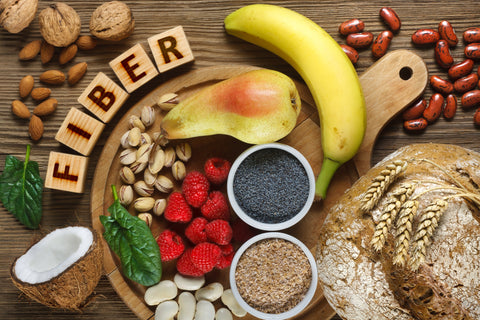How Fibre Can Help You Lose Weight

Fibre is an essential nutrient that plays a crucial role in maintaining good health. It is well known for its ability to promote digestive health, regulate blood sugar levels, and reduce the risk of heart disease and other chronic illnesses. But, did you know that fibre can also be an effective tool for weight loss? In this article, we will explore how taking a fibre supplement can help you lose weight and provide some tips for incorporating fibre into your diet.
What is Fibre?

Before we dive into the benefits of fibre supplements for weight loss, it's important to understand what fibre is and how it works in the body. Fibre is a type of carbohydrate that is found in plant-based foods such as fruits, vegetables, whole grains, and legumes. Unlike other types of carbohydrates, fibre cannot be digested by the body, so it passes through the digestive system mostly intact.
There are two main types of fibre: soluble fibre and insoluble fibre. Soluble fibre dissolves in water and forms a gel-like coating in the digestive system. It can slow digestion, moderate absorption of glucose into the bloodstream, and improve the overall health of your gut and digestive system. Insoluble fibre does not dissolve in water and can help promote regular bowel movements by adding bulk to your stool.
How A Fibre Supplement Can Help You Lose Weight
The primary way fibre helps you lose weight is by increasing your satiety - the feeling of fullness. Consuming high fibre foods can leave you feeling fuller for longer.
Maintaining a calorie deficit is one of the most effective and healthy ways to lose weight, that is: burning more calories than you consume each day. Increasing your satiety can help to decrease your appetite and increase feelings of fullness, helping to limit cravings and decrease the overall amount of food you feel like consuming.
Additionally, soluble fiber supplements, such as beta-glucan in particular, can help to regulate blood sugar levels. This can help to reduce craving for foods high in sugar and fat that often contribute to weight gain.
Finally, certain fiber supplements can act as a prebiotic and increase the overall health of the bacteria in your gut known as your gut microbiome. A healthy gut microbiome has been linked to improved weight management, as well as numerous other health benefits such as improved digestion and immunity.
Why beta-glucan is the best fibre supplement for losing weight?
Beta-glucan is a type of soluble fibre extracted from barley and oats. Beta-glucan specifically has been proven to help increase satiety, regulate blood glucose levels, and can help you to lose weight. Brands such as NutraStat produce a single ingredient beta-glucan supplement making it easy to incorporate into your diet. It is flavourless so you can add it to anything. Always seek out brands that have simple ingredient decks and are free from sugar, flavouring, and other harmful additives.

Tips for success:
- Start slowly. Increase fibre intake gradually to allow your body to adapt. Increasing fibre intake too quickly can cause bloating and gas.
- Keep to a routine. Take your supplements regularly to ensure maximum results.
- When increasing fibre intake, always be sure to increase water intake as well. This helps to prevent constipation, promote regular bowel movements, and can help increase satiety as well.
- Try eating more high fibre foods in general. Foods high in fibre tend to be lower in calorie density, meaning they provide fewer calories per gram. By choosing high-fibre foods such as fruits, vegetables, whole grains, and legumes, you can reduce your overall calorie intake while still feeling full and satisfied.
Conclusion
While taking a fibre supplement won’t magically make you lose weight, it can help to reduce the number of calories you are consuming each day. If you are able to maintain a calorie deficit for an extended period of time, you should see a decrease in overall weight. As a bonus, you’ll also benefit from improved blood sugar control, decreased cholesterol, and improved gut health and digestion that comes with increased fibre intake.

Sources:
https://www.ncbi.nlm.nih.gov/pmc/articles/PMC5082693/

